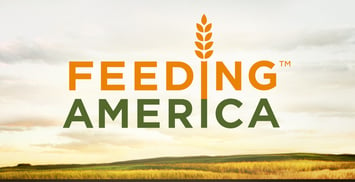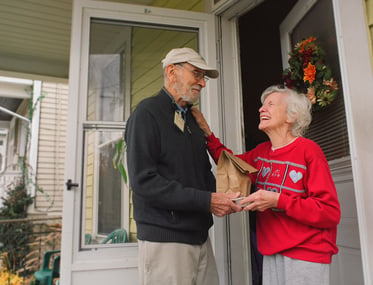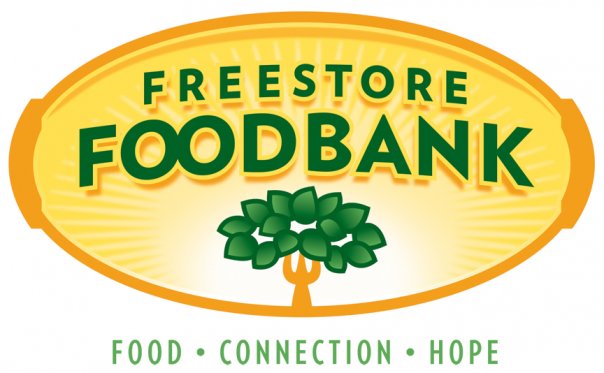Summer in Cincinnati brings with it an abundance of locally grown produce. At least, it does for some. For low-income seniors, or seniors with mobility issues that make it difficult to get to a grocery store or farmer’s market, it can be a real challenge to obtain fresh, affordable and healthy produce.That’s why a partnership between Episcopal Retirement Services and Cincinnati’s FreeStore FoodBank seemed natural.
"Nearly 1 in 5 seniors face the prospect of not having enough to eat."
Three times over the course of the summer, the FreeStore FoodBank delivers a 1.5-ton shipment of fresh fruits and vegetables to St. Paul Village in Madisonville. There, our staff members carefully unpack, sort and re-distribute the food to seniors residing in Cincinnati’s Affordable Living by ERS communities.
This past month, each recipient senior received oranges, plums, sweet corn, greens, squash and a head of either cabbage or broccoli. That might not sound like much, but for a senior of limited means or limited mobility, it’s a vital supply of crucial vitamins and minerals that can help older people avoid nutritional deficiencies.
Feeding America® in a time of food insecurity
The FreeStore FoodBank is just one of many organizations nationwide participating in the Feeding America® partnership — a network of more than 200 U.S. food bank and social service agencies, representing the largest ongoing domestic hunger-relief effort.
Feeding America® reports that it serves more than 46 million hungry Americans every year, including 12 million children and 7 million seniors. To put those numbers in context: More than 1 in 7 Americans are dealing with food insecurity.
AARP reported that, nationwide, food insecurity for adults 40 and over spiked during the Great Recession in 2008. It has remained at historically high levels since then, despite the country’s sustained economic recovery.
A great need in the Tristate
According to the National Foundation to End Senior Hunger (NFESH)’s most recent report, Ohio and Kentucky rank 10th and 11th worst in the United States (respectively) in terms of the percentage of seniors who face the threat of hunger. In both states, nearly 1 in 5 seniors face the prospect of not having enough to eat.
The situation is only marginally better in Indiana, where the portion of elderly people facing hunger exceeds 15 percent — still more than double the senior hunger rate of the best-performing state (North Dakota). Regardless, in all three states, seniors’ food insecurity grew between 2013 and 2014.
The increase in Tristate need has been the most dramatic in the Buckeye State. In 2012, 12.92% of older Ohioans faced hunger; in 2014, the portion of food-insecure seniors was up to 17.56%.
Food insecurity among seniors must be addressed in unique ways
As a University of Central Florida (UCF) report to AARP concluded, seniors’ food insecurity needs aren’t well addressed by conventional hunger-relief programs.
“It is unreasonable to think blanket policies that aim to treat all populations as though their need for food transforms them into one homogeneous group will be successful,” wrote Strickhouser, et al. “Populations with distinct needs, like older adults studied here, deserve attention from public policy that takes into account their unique position in the life course.”
 Whereas hunger in younger populations is, for the most part, related to socioeconomic factors like underemployment and education, senior hunger is strongly tied to health concerns, mobility and transportation issues, and the effect of economic inflation on individuals with fixed incomes.
Whereas hunger in younger populations is, for the most part, related to socioeconomic factors like underemployment and education, senior hunger is strongly tied to health concerns, mobility and transportation issues, and the effect of economic inflation on individuals with fixed incomes.
“In particular, policies that aim to alleviate food insecurity must be sensitive to older Americans’ varying degrees of physical well-being, volatile or fixed incomes and weakening social ties to rely on for assistance,” the UCF researchers wrote.
Organizations like the FreeStore FoodBank, Deupree Meals on Wheels and Affordable Living by ERS are helping Cincinnati’s seniors to make ends meet, but need is much greater than the supply of currently available resources. We could use your help.
Help alleviate senior hunger
If you are a senior living in Cincinnati and you are facing food shortfalls, please contact Deupree Meals On Wheels or the FreeStore FoodBank so that we can see what programs might benefit you. Or, if you have an idea for helping older Tristate residents obtain the nutrition they need, let us know about it!
In the meantime, ERS and the FreeStore FoodBank will keep working to deliver fresh produce from local farms, direct to Cincinnati’s neediest seniors, every summer.













